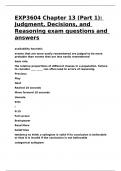Exp3604 - Study guides, Class notes & Summaries
Looking for the best study guides, study notes and summaries about Exp3604? On this page you'll find 52 study documents about Exp3604.
Page 4 out of 52 results
Sort by
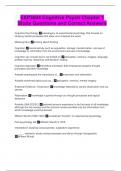
-
EXP3604 Cognitive Psych Chapter 1 Study Questions and Correct Answers
- Exam (elaborations) • 6 pages • 2024
- Available in package deal
-
- $9.99
- + learn more
Cognitive Psychology subcategory of experimental psychology that focuses on studying mental processes that allow us to interpret the world Metacognition thinking about thinking Cognition mental activity such as acquisition, storage, transformation, and use of knowledge or information from the environment and use of knowledge Cognition can include (but is not limited to) perception, memory, imagery, language, problem solving, reasoning, and decision making Cognitive Approach theoretical orien...
EXP3604 Chapter 13 (Part 1) Judgment, Decisions, and Reasoning exam questions and answers
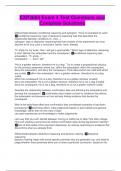
-
EXP3604 Exam 4 Test Questions and Complete Solutions
- Exam (elaborations) • 5 pages • 2024
- Available in package deal
-
- $9.49
- + learn more
Differentiate between conditional reasoning and syllogism. Think of examples for each. conditional reasoning: type of deductive reasoning task that describes the relationship between conditions (if...then...) syllogism: type of deductive reasoning task that consists of two statements we must assume to be true, plus a conclusion (some, none, always) "If I study for my exam, then I will get a good grade." Which type of deductive reasoning is this? Identify the antecedent and the consequent. con...
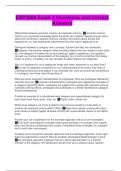
-
EXP3604 Exam 3 Questions and Correct Answers
- Exam (elaborations) • 4 pages • 2024
- Available in package deal
-
- $8.99
- + learn more
Differentiate between semantic memory and episodic memory. semantic memory refers to our organized knowledge about the world, but it doesn't specify how we came about that information; episodic memory contains information about events that happened to us, and emphasizes when/where/how that event happened to us Distinguish between a category and a concept. Explain how they are connected. category: the physical category where we place objects that are related to each other (ex: the category frui...
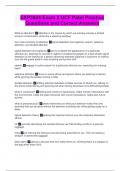
-
EXP3604 Exam 2 UCF Patel Practice Questions and Correct Answers
- Exam (elaborations) • 5 pages • 2024
- Available in package deal
-
- $8.99
- + learn more
What is attention? Attention is the means by which we actively process a limited amount of information (think like a selective window) four main functions of attention signal detection and vigilance, search, selective attention, and divided attention signal detection and vigilance we try to detect the appearance of a particular stimulus (ex. listening for sounds or sights of unwelcome people on a dark street) signal detection is like looking for a person drowning whereas vigilance is long term...
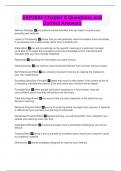
-
EXP3604 Chapter 6 Questions and Correct Answers
- Exam (elaborations) • 3 pages • 2024
- Available in package deal
-
- $8.99
- + learn more
Memory Strategy you preform mental activities that can help to improve your encoding and retrieval Levels of Processing shows that you will generally recall information more accurately if you process it at a deep levels rather than a shallow one Elaboration you will concentrate on the specific meaning of a particular concept; you'll also try to relate this concept to your prior knowledge and to interconnected concepts that you have already mastered Rehearsal repeating the information you wan...
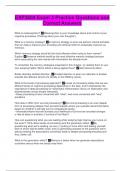
-
EXP3604 Exam 3 Practice Questions and Correct Answers
- Exam (elaborations) • 3 pages • 2024
- Available in package deal
-
- $8.99
- + learn more
What is metacognition? Metacognition is your knowledge about and control of your cognitive processes ("thinking about your own thoughts"). What is a memory strategy? A memory strategy is when we perform mental activities that can help to improve your encoding and retrieval (effort to essentially improve our memory). Which memory strategy would be the most effective when trying to learn names? Explain Keyword method would be the most effective memory strategy because we're associating the ne...
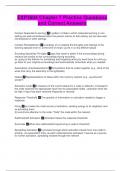
-
EXP3604 Chapter 7 Practice Questions and Correct Answers
- Exam (elaborations) • 3 pages • 2024
- Available in package deal
-
- $8.99
- + learn more
Context Dependent Learning A pattern of data in which materials learning in one setting are well remembered when the person returns to that setting, but are less well remembered in other settings Context Reinstatement a strategy of re-creating the thoughts and feelings of the learning episode even if, at the time of recall, you're in a very different place Encoding Specificity Principle says that recall is better if the surroundings during retrieval are similar to the surroundings during enco...
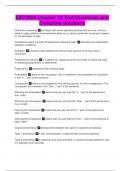
-
EXP3604 Chapter 12 Test Questions and Complete Solutions
- Exam (elaborations) • 3 pages • 2024
- Available in package deal
-
- $8.99
- + learn more
Deductive reasoning you begin with some specific premises that are true, and you need to judge whether those premises allow you to draw a particular conclusion, based on the principles of logic Conditional reasoning task (Propositional reasoning task) describes the relationship between conditions. Syllogism consists of two statements that we must assume to be true, plus a conclusion Propositional calculus is a system for categorizing the four kinds of reasoning used in analyzing propositions ...
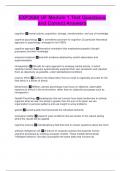
-
EXP3604 UF Module 1 Test Questions and Correct Answers
- Exam (elaborations) • 3 pages • 2024
- Available in package deal
-
- $8.99
- + learn more
cognition mental activity; acquisition, storage, transformation, and use of knowledge cognitive psychology (1) sometimes synonym for cognition (2) particular theoretical approach to psychology; emerged in mid 1950's cognitive approach theoretical orientation that emphasizes people's thought processes and their knowledge empirical evidence scientific evidence obtained by careful observation and experimentation introspection (Wundt) An early approach to studying mental activity, in which car...

$6.50 for your textbook summary multiplied by 100 fellow students... Do the math: that's a lot of money! Don't be a thief of your own wallet and start uploading yours now. Discover all about earning on Stuvia

